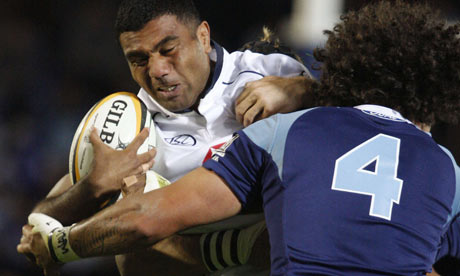
Super 14 coaches in Australia have reacted with anger and dismay after a conference in London this week recommended that the most contentious of the experimental law variations, including the ones that downgraded most offences to free-kicks, should not go into the law book.
"When you see games played under ELVs and then Test matches under the old laws they are markedly different," said the Waratahs' coach, Chris Hickey. "I don't think that's a good direction for the game to move in and you'll find teams winning games by kicking penalty goals and not playing much footy."
Europe refused to trial the variations, which turned most offences from penalties into free-kicks, but they have been trialled in the Super 14 and Tri-Nations where there have been complaints that they were a cheats' charter with players happy to kill the ball knowing they did not face a three-point penalty.
"There is nothing wrong with the sanctions, just how referees use them," said the Queensland Reds coach, Phil Mooney. "It comes to a point that if players are continually giving away cynical penalties they have to act harder and if they do that the laws are good."
The Western Force coach, John Mitchell, a former England assistant coach, added: "I think the half-arm is a great concept and it's totally necessary for us in Australian rugby in the sporting market that we live in. It creates an element where it asks the defence to respond quickly or negatively, and I guess that's what the game's all about."
Australia have championed the variations, but they were the only country at the Lensbury Court conference to argue for all of them to become official when the International Rugby Board's council next month debates the ELVs. While 10 are likely to progress beyond the trial stage, all bar two of them are technical and will have no impact on the way the game is played.
The ones permitting the collapsing of mauls, ending the restriction on numbers in the lineout and making most offences punishable by a free-kick rather than a penalty were rejected by the conference. While the final decision rests with the IRB's council, the result is virtually a foregone conclusion with most of Europe united in their opposition.
The board said a decision on the variations governing sanctions had been deferred, but they were all rejected, with the delegates instead asking for clarification on the laws governing the breakdown. "The deferral is not a good sign," said Hickey. "The sanctions variations are the heart of the ELVs and the ones they have ticked off, while good for the game, are peripheral.
"The northern hemisphere unions have got their way in keeping laws which suit their forward-focused game. If they go back to the penalty kicks you'll see a game that's completely dominated by 30-40 lineouts and driving mauls."
The Australian Rugby Union chief executive, John O'Neill, who championed the variations at the conference, has yet to comment on their emasculation. Last year he warned that the game faced a split between the hemispheres if the ELVs were rejected, asking: "What would a World Cup be like without Australia, New Zealand and South Africa in it? No one wants to see two games, but unless there is a degree of reasonableness, it could happen."

